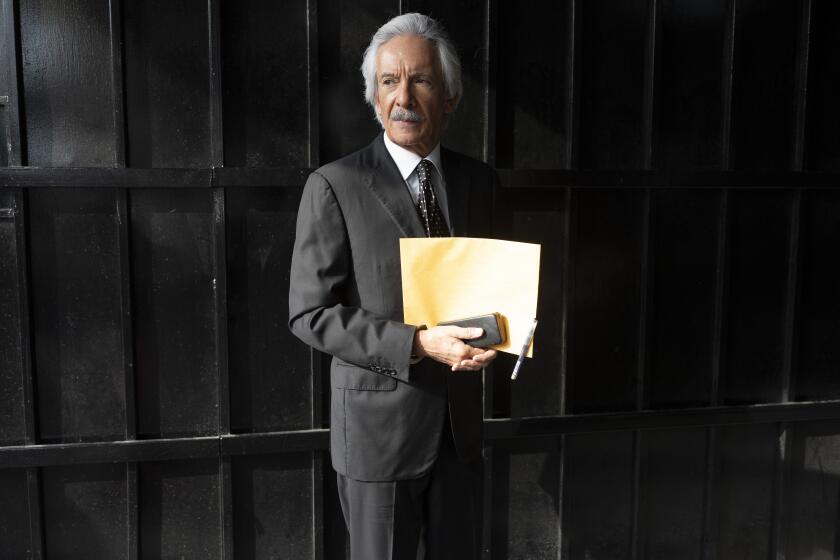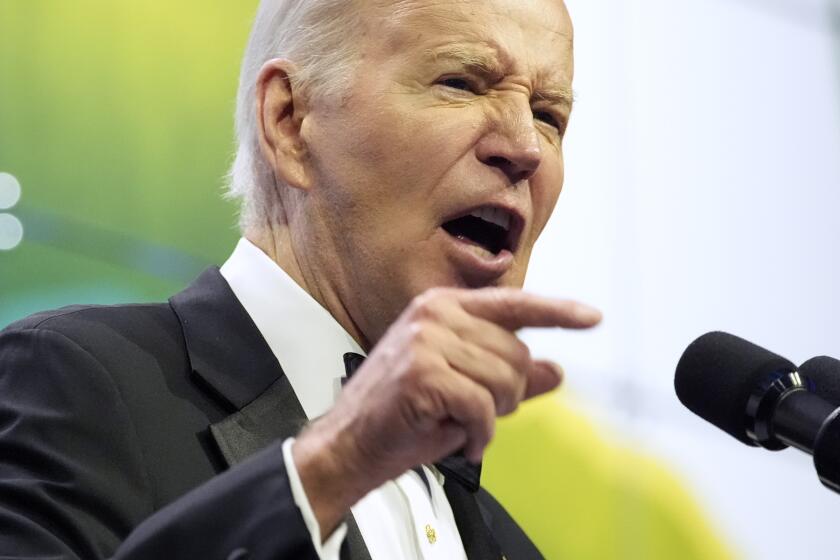Unlike the Berlin Wall, No Sign Castro Will Fall : Foreign Policy: The Soviet Union has cut its help to Fidel, but his magnetic appeal continues to hold a majority of his countrymen.
“Fidel doesn’t fall, not even from his bed.”
So goes a popular Cubanism, often repeated throughout the island after one of Washington’s habitual predictions of Castro’s imminent ruin. But the bed is starting to wobble from the pounding Cuba has been taking in recent months as a result of dwindling economic help from its main partner, the Soviet Union.
Castro is long accustomed to U.S. efforts to weaken his regime. But now, the United States has been joined by new and unexpected allies. The supply shortage from the Soviet Union and the weaker but still very effective economic sanctions imposed by some European countries have seriously affected Cubans.
“It’s sad to see the deterioration of the economy and daily life in Cuba,” wrote Froylan Lopez, a columnist for the Mexican newsmagazine Proceso. “The only socialist government in America has been forced to ration the consumption of essential goods.”
Until now, the U.S. economic blockade, the ideological war launched through Radio and T.V. Marti, the “hostile acts,” as Castro calls Washington’s military maneuvers near his island, the endless verbal attacks from government officials--none of these American efforts has had the desired effect.
There are moments in the history of any country when events converge to produce serious and profound change. This seems to be one of those moments in the life of Cuba, with or without U.S. influence.
The island cannot continue being what it has been when its main supporter, the Soviet Union, is putting in place purely capitalistic principles. The words of Vladimir Zheranovski, one of Moscow’s rising leaders of the opposition, reflect some of the forces shaking Castro’s bedsprings.
“Sharing is not lucrative,” he said recently. “Efforts should be oriented (to) produce something in exchange. The national interest must be placed ahead of solidarity with underdeveloped countries.”
What seems clear now that the peak of Castro’s latest crisis is passing is that changes in Cuba are not going to happen while he still holds power. Castro remains the country’s undisputed and charismatic leader, followed by the vast majority of his people and admired by important intellectuals and politicians worldwide. With his enthusiasm, his faith, and his magnetic appeal, he can move his people as he likes and maintain the revolutionary pride in Cuban sovereignty.
“The truth is that the paternal figure of Fidel continues to exert an unlimited fascination over the majority of Cubans,” exuded a leading Latin magazine not long ago. However, Cuba’s unavoidable transformation must be separated from the spreading joy over the worldwide “triumph of capitalism.” Castro’s defeat would be nothing to crow over. It would signify the end of the socialist ideal and its dream of a better life in which wealth is shared by all, in which the wealth of the rich is transferred to the poor.
That dream has never been a feature of the capitalist promise.
The tendency to magnify capitalism’s virtue is making people believe there is no other possible way. But in the capitalist world, there is much that is not worth celebrating.
Seen from the point of view of many south of the U.S. border, for example, the Latin poor fill the coffers of the U.S. banks through crushing and oppressive external-debt payments.
If it is true that some Latins can live well with capitalism, the majority do not. It is a dangerous mistake to convert capitalism’s vices into virtues simply because the Marxist regimes have failed to fulfill their socialist ideals. Most of Latin America’s capitalist democracies are characterized by injustice, poverty, unemployment, hunger, illness, electoral fraud, political and racial murder and torture. And those ills are suffered by the majority of the population throughout the continent.
For that reason, it is still valid to ask which is worse: The “capitalist freedom” offered by these countries? Or the “ideological rigidity” of Castro’s Cuba, where until now nobody has died from starvation, people live longer and healthier than anywhere else in Latin America, education is universal, housing and jobs are available, and people can afford to feed their families? Behind the arrogance and intransigence of which his detractors accuse him, Castro is the last leader on the world stage who still believes in the promise of socialism. The idealism that many in the United States interpret as destructive blindness has permitted Castro to maintain his regime--and his country’s pride--until now.
Pride was the foundation of the Cuban revolution, and remains so to this day, 37 years later. It would be a mistake to pigeonhole Castro as another communist failure. His revolution, his regime, his communism are too different from the East European models to expect him to fade because they have. Castro’s revolution, remember, was conducted for and by Cubans, not imposed from outside. And that is why it is wrong to try to force Cuba into the inevitable wave of reform sweeping Marxist regimes elsewhere.
Sooner or later, international pressure, age, death, political upheaval at home--any or all will bring Castro down. And that will be the end of an ideal. But what must be avoided is that Castro’s end becomes a catastrophe for Cuba.
Unfortunately, in the eyes of many analysts, Cuba’s problems spring solely from Castro’s intransigence. They ignore all the international factors that are bearing down on his country.
Washington’s stubbornness and its insistence in its right to intervene in other countries could convert natural and healthy political change in Cuba into disaster. Instead of attacks, Cuba needs support now that world conditions are pressing it for change.
As Mexican opposition leader Cuauhtemoc Cardenas has proposed, the last best hope for Cuba may lie with its closest neighbors. Latin American countries must open their doors to new possibilities of regional integration with Cuba.
It may be the only way Cuba can repair Castro’s wobbling bed.
More to Read
Start your day right
Sign up for Essential California for news, features and recommendations from the L.A. Times and beyond in your inbox six days a week.
You may occasionally receive promotional content from the Los Angeles Times.






